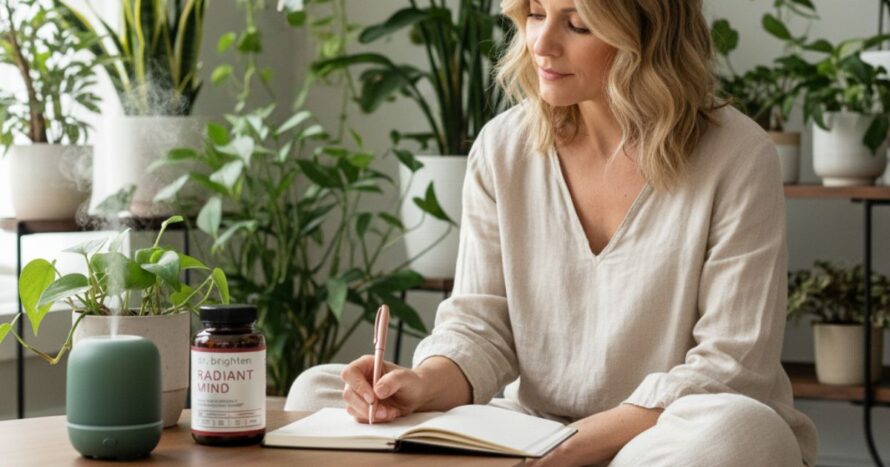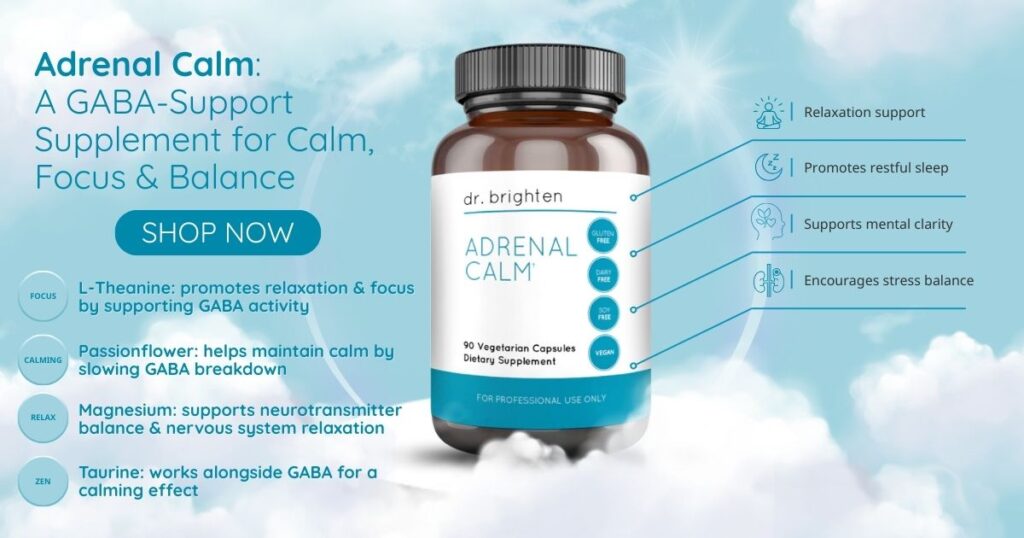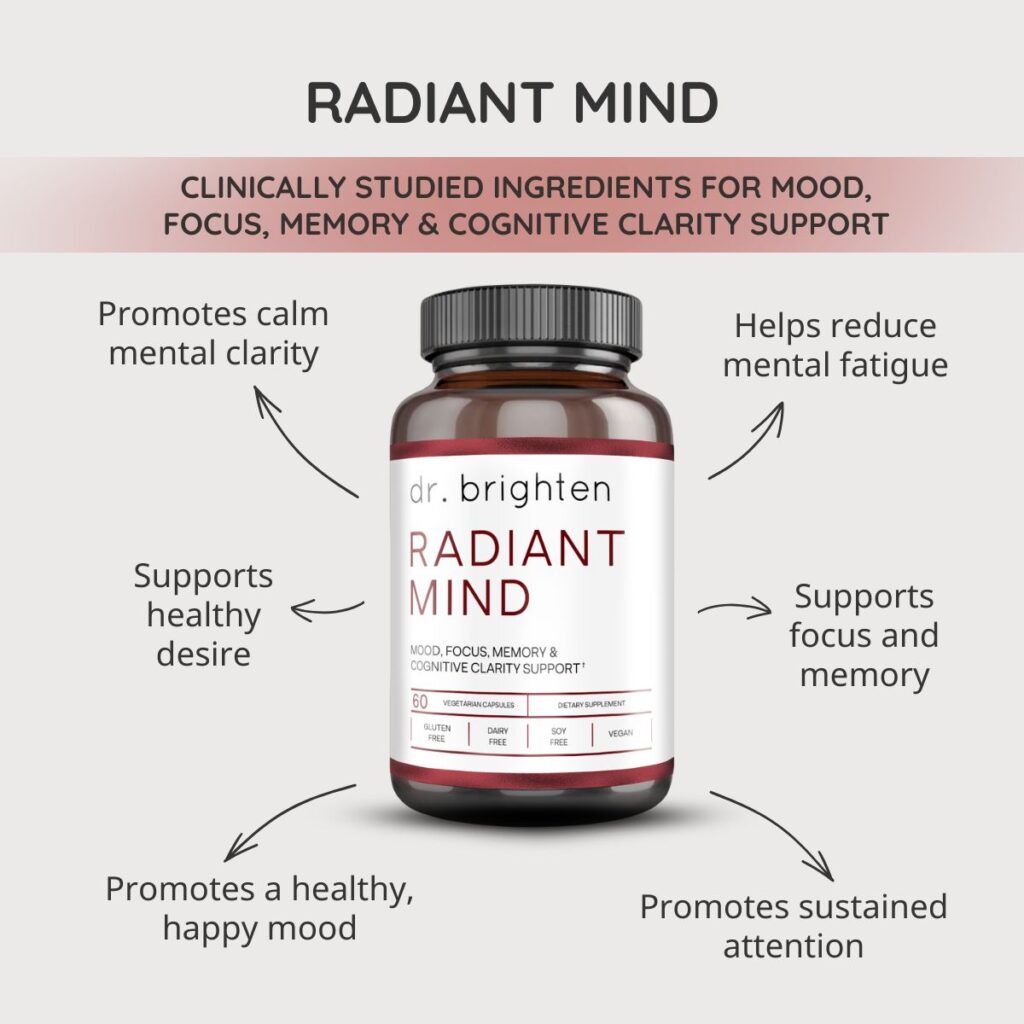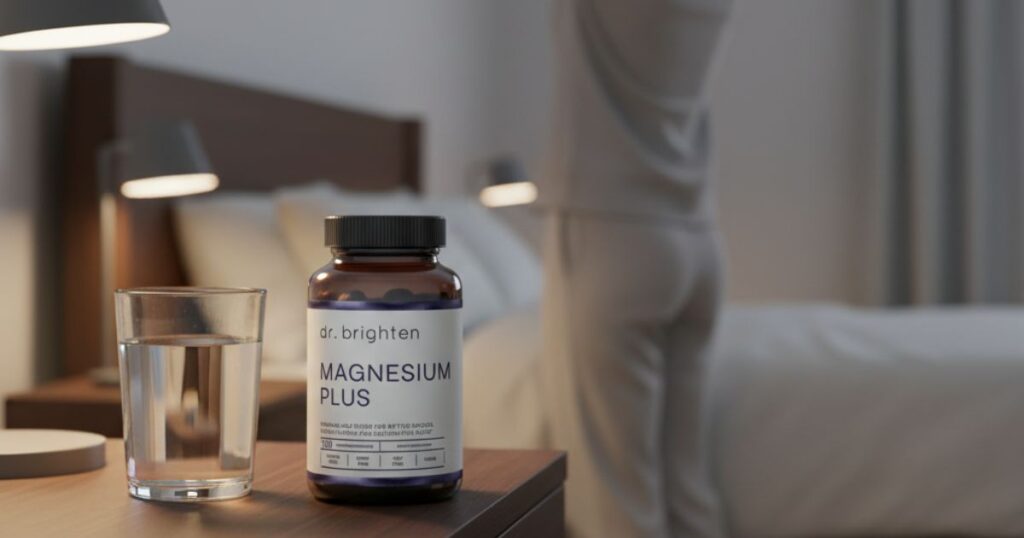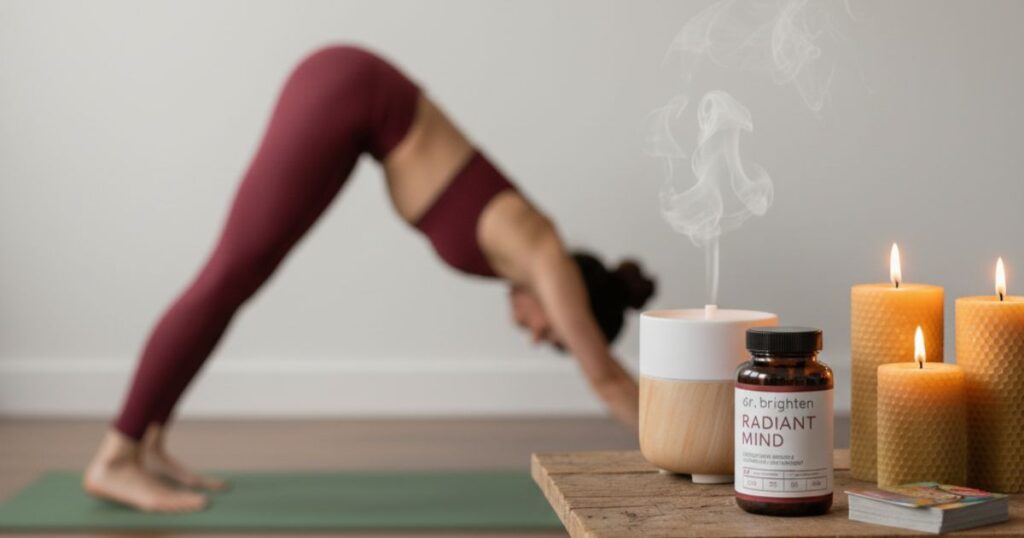Anxiety is one of the most common mental health challenges globally, especially among women, young adults, and teenagers. Nearly 1 in 3 adults in the U.S.1 will experience an anxiety disorder at some point in their lives, which can range from generalized anxiety to panic attacks, social anxiety, and other types.
What's so alarming is that these numbers have been rising steadily over the past several decades, and don't necessarily seem to be slowing down, particularly among young people.
While conventional treatments for anxiety, such as cognitive behavioral therapy (CBT) and prescription medications (like SSRIs and benzodiazepines), can be effective, they’re not the only option. Many people today prefer to treat mental health challenges with a holistic approach, which can include anxiety supplements, nutritional support, and lifestyle changes.
An integrative approach is most helpful for those with mild to moderate anxiety (such as anxiety before your period), those who are looking to minimize side effects from medications, and anyone wanting to support their nervous system naturally. Let's take a look at how to do it.
In this article:
- TL;DR: Anxiety and Supplements: What Really Works
- What Causes Anxiety? And How Is It Different From Everyday Stress?
- Can Vitamin Deficiencies Cause Anxiety?
- Best Vitamins for Anxiety and Panic Attacks
- Best Supplements for Stress and Anxiety Relief
- Supplements for Anxiety: Quick Comparison
- Magnesium Pills for Anxiety: What to Know
- B Complex for Stress and Anxiety
- Bacopa (Bacopa monnieri) for Anxiety and Cognitive Support
- Saffron Extract for Anxiety and Mood Support
- Lemon Balm (Melissa officinalis) for Stress and Anxiety
- Herbal Supplements for Anxiety Relief
- Supplements for Sleep-Related Anxiety
- What Else Helps With Anxiety?
- Frequently Asked Questions About Anxiety and Supplements
- Final Thoughts: Do Anxiety and Supplements Really Work Together?
TL;DR: Anxiety and Supplements: What Really Works
- Anxiety is multifactorial (stress hormones, sleep, nutrient gaps, hormones, gut, genetics). A holistic plan pairs clinical care (e.g., CBT/meds when indicated) with lifestyle and targeted nutrition.
- Key nutrient gaps linked with anxious feelings: magnesium, B6/B12/folate, vitamin D, zinc, and omega-3s. Checking and correcting deficiencies may support mood, stress tolerance, and sleep.
- Magnesium supplements and anxiety: glycinate and threonate are commonly used to support relaxation, sleep quality, and calm.
- Anxiety and vitamins: a balanced B complex can support neurotransmitter production (serotonin, dopamine, GABA) and energy metabolism.
- Herbal options with evidence for mild to moderate anxiety/stress: saffron, bacopa, ashwagandha, lemon balm, L-theanine, rhodiola, valerian (especially for sleep).
- Formulas as examples (education, not treatment):
- Radiant Mind (saffron, bacopa, citicoline, zinc) — supports focus, mood balance, and resilience.
- Adrenal Calm (lemon balm, L-theanine, ashwagandha, valerian) — supports evening wind-down and sleep quality.
- Magnesium Plus (magnesium glycinate) — gentle, well-absorbed support for nervous system calm.
- Foundations still matter: consistent sleep, movement, breathwork, reducing alcohol/caffeine, therapy, sunlight/nature, and somatic/mindfulness practices.
What Causes Anxiety? And How Is It Different From Everyday Stress?
Anxiety is more than just feeling stressed.
Stress is usually short-term and related to a specific situation. For example, running late for a meeting, missing a deadline, or arguing with your partner could all cause stress.
Anxiety, on the other hand, is a more chronic experience. It often involves persistent worry, fear, or tension, even when there’s no immediate threat. The fact that anxiety doesn't always have a clear cause can actually make it even worse, since this makes it harder to solve.
Common Causes of Anxiety:
Anxiety can be caused by many different factors, plus each person's anxiety can be triggered by different things. Common contributors to ongoing anxiety include:
- Imbalanced neurotransmitters (low serotonin, GABA, dopamine)
- Chronic stress and overactive cortisol levels
- Vitamin or mineral deficiencies, such as in vitamin D, magnesium, and B vitamins
- Lack of sleep or poor sleep quality
- Inflammation and oxidative stress, which can be caused by a poor diet and other factors
- Gut microbiome imbalances
- Hormonal imbalances (especially during perimenopause or PMS, or those associated with PMDD)
- Genetics, trauma, or personality traits
- ADHD (for more on this connection, read: ADHD and Anxiety: How to Tell the Difference and What to Do About It)
In women in particular, anxiety can be the result of hormonal fluctuations2 throughout the menstrual cycle, pregnancy, postpartum period, or perimenopause. Here's more about the anxiety hormone connection in women:
- Estrogen and progesterone shifts can affect neurotransmitters like serotonin and GABA, which are involved in regulating moods and anxiety.
- During perimenopause and menopause, declining estrogen levels are linked to increased rates of anxiety, panic attacks, and sleep disturbances.
- Postpartum hormonal drops are another common trigger for heightened anxiety in women after childbirth.
Women are nearly twice as likely to experience anxiety disorders3 compared to men.
Young adults and teens are also more affected, due to issues like social pressure and shifting hormone levels. Anxiety disorders are currently the most common psychiatric conditions4 in children and adolescents, affecting nearly 1 in 12 children and 1 in 4 adolescents.
Related:
Perimenopause Anxiety Disorder: Can Unbalanced Hormones Like Progesterone Cause Anxiety?
How Hormones Affect Mood Throughout Your Menstrual Cycle

Can Vitamin Deficiencies Cause Anxiety?
Yes, it's possible for several key nutrient deficiencies to be linked to increased anxiety, as well as nervousness, sleep disturbances, mood swings, fatigue, and depression.
Having low levels of these nutrients can potentially be a contributing factor to anxiety and other mental health issues:
- Magnesium: Magnesium helps to balance and regulate the nervous system and promotes relaxation by influencing GABA activity. Low levels are linked to increased anxiety and stress sensitivity5, and in some cases, poor sleep (which can further cause anxiety).
- Vitamin B12: A deficiency in B12 can impair the production of neurotransmitters like serotonin and dopamine, potentially leading to mood disorders, including anxiety and depression.
- Folate (B9): Folate is essential for methylation and neurotransmitter synthesis, and low levels have been associated with increased risk of anxiety and depression, particularly in pregnant or postpartum women.
- Vitamin B6: B6 helps synthesize key neurotransmitters such as serotonin and GABA, and low levels can impair mood regulation and heighten anxiety symptoms.
- Zinc: Zinc is involved in brain signaling and inflammation control. Zinc deficiency has been associated with mood imbalances and increased vulnerability to anxiety and depression.
- Omega-3 fatty acids: These essential fats support brain cell structure and reduce neuroinflammation. Low omega-3 status, which is common in many developed countries, is tied to greater rates of anxiety and cognitive dysfunction.
- Vitamin D: Vitamin D receptors are found in the brain and influence mood-regulating pathways. Deficiency in vitamin D, another very common issue, can cause worsened anxiety and depressive symptoms.
For example, a 2020 review in Current Nutrition Reports found that deficiencies in B vitamins, magnesium, and omega-3s are consistently associated with mood disorders, including anxiety and depression.
Best Vitamins for Anxiety and Panic Attacks
While no single vitamin “cures” anxiety or panic attacks, research suggests that certain nutrients play an important role in nervous system health, stress resilience, and mood regulation. If your diet is lacking in these vitamins, you may be more vulnerable to anxious feelings, poor stress tolerance, or low energy.
Vitamins that may support calm and resilience include:
- Vitamin B6 – Supports the production of neurotransmitters like serotonin and GABA, which are key in regulating stress responses.
- Vitamin B12 – Deficiency in B12 has been linked to mood changes and feelings of fatigue that may worsen anxiety symptoms.
- Folate (Vitamin B9) – Important for methylation and neurotransmitter balance; low levels have been associated with greater risk of mood disorders.
- Vitamin D – Plays a role in brain signaling and hormone pathways that influence mood; deficiency is common and associated with increased rates of anxiety and depression.
- Vitamin C – An antioxidant that supports adrenal health and the body’s response to stress.
If you suspect you’re deficient, a blood test with your healthcare provider can help guide whether adding supplements makes sense for you.
Best Supplements for Stress and Anxiety Relief
Many people today are unknowingly undernourished due to consuming foods grown in depleted soil, eating highly processed diets, and dealing with chronic stress (which increases nutrient demand). That’s why supplementing with the right nutrients can play a powerful role in restoring balance and supporting mental health.
Supplements for Anxiety: Quick Comparison
| Nutrient / Herb | How It Helps |
| Magnesium | Supports relaxation by influencing GABA activity and lowering stress hormones. Magnesium may support an anxious mind6. |
| Vitamin B Complex | Contributes to neurotransmitter production and energy metabolism; may reduce fatigue and mood changes. Various B vitamins may support a calm mind, with vitamin B6 being shown to reduce feelings of anxiety and stress7. |
| Vitamin D | Plays a role in brain signaling and mood regulation8 |
| Omega-3 Fatty Acids | Reduces neuroinflammation; supports brain structure and mood9 |
| Ashwagandha | Adaptogen studied for stress resilience and cortisol balance10 |
| Bacopa (Bacognize®) | May improve focus, memory, and emotional well-being11 |
| Saffron (Affron®) | Studied for mood, sleep, and calmness12 |
| L-theanine | Increases alpha brain waves and supports calm alertness13 |
| Rhodiola | May help with stress adaptation and reduce fatigue14 |
| Valerian Root | Traditionally used for sleep and relaxation15 |
| Lemon Balm | May increase GABA activity; studied for stress and mild anxiety16 |
Magnesium Pills for Anxiety: What to Know
Magnesium is often called “nature’s chill pill,” and for good reason. Your body needs magnesium to carry out over 300 enzyme reactions, many of which regulate the nervous system. Low magnesium has been linked to increased cortisol, excitatory glutamate, and poor GABA signaling, all of which can worsen anxiety.
One review17 found that magnesium supplementation could help many people dealing with anxiety and insomnia to better manage their symptoms.
Why it helps:
- Supports calmness and relaxation by binding to GABA receptors.
- Helps lower cortisol and adrenaline.
- Can help improve sleep quality and duration.
- Can reduce muscle tension, restlessness, and heart palpitations.
Best forms:
- Magnesium glycinate (the type found in my Magnesium Plus formula) is calming and gentle on the stomach.
- Magnesium threonate, which crosses the blood-brain barrier, is great for mood and cognition.
- Magnesium citrate, which is good for digestion, can act as a laxative at high doses.
Many users report noticeable relief from anxiety, irritability, and insomnia within 1–2 weeks of supplementing with magnesium.
Forms like magnesium glycinate (such as those in Magnesium Plus) are gentle, well-absorbed, and commonly used for nervous system support.
B Complex for Stress and Anxiety
Anxiety and B vitamins go hand-in-hand, considering B vitamins fuel the production of key neurotransmitters like serotonin, dopamine, and GABA. One study18 found that higher intake of dietary B vitamins, especially biotin (B7), was associated with a lower prevalence of depression, anxiety, and stress symptoms.
Benefits of B vitamins for mental health include:
- Vitamin B7: Supports nerve and metabolic functions.
- Vitamin B6: Supports GABA production and hormone balance.
- Vitamin B12: Deficiency is strongly linked to anxiety and depression.
- Folate (B9): Crucial for methylation and emotional regulation.
- B1 and B3: Help manage the physical effects of chronic stress.
- B5: Key for adrenal function and cortisol metabolism.
Supplementing with a full-spectrum B complex, such as B Active Plus, for stress and anxiety can improve energy, reduce fatigue, and support mood stabilization.
Bacopa (Bacopa monnieri) for Anxiety and Cognitive Support
Bacopa monnieri is an adaptogenic herb long used in Ayurvedic medicine to support memory, learning, and calmness.
How bacopa may help:
- Supports serotonin and acetylcholine levels, which are important for mood and cognitive function.
- May reduce cortisol activity, helping the body adapt to stress.
- Has antioxidant properties that protect brain cells from oxidative stress.
- Clinical trials have found bacopa can improve attention, memory, and self-reported well-being when used consistently for several weeks.
Standardized extracts such as Bacognize® are the most researched forms of bacopa. Studies19 have shown that Bacognize® may help reduce occasional anxious thoughts, support cognitive performance, and promote emotional steadiness.
One review found that Bacopa extract can help to significantly improve cognitive performance20 in adults when used for two to three months, while others have found it helps reduce anxiety and depression21 due to its ability to balance brain chemicals and hormonal pathways.
A double-blind, placebo-controlled trial published in the Journal of Functional Foods22 found that Bacopa monnieri (150 mg twice daily) increased self-reported emotional well-being and general health and reduced pain over the course of 28 days.
Bacopa is one of the core ingredients in Radiant Mind, alongside saffron extract (Affron®), citicoline (Cognizin®), and zinc. Together, these nutrients are formulated to support focus, mood balance, and resilience to daily stress.
Saffron Extract for Anxiety and Mood Support
Saffron, the vibrant red stigma of the Crocus sativus flower, has been used for centuries in traditional medicine and is now one of the most researched botanicals for mood support. Modern clinical trials suggest saffron may help maintain emotional balance and reduce occasional feelings of anxiety. Affron®, a potent extract of saffron (Crocus sativus) has been clinically shown to help reduce anxiety, depression, and sleep problems23.
How saffron may help:
- Supports serotonin activity in the brain, which plays a role in calmness and positive mood.
- Has antioxidant and neuroprotective effects that may buffer the brain against stress.
- May help regulate cortisol activity and support healthier sleep patterns.
- Clinical studies and meta-analyses have found saffron extract can improve mood and reduce symptoms of mild to moderate anxiety and depression compared with placebo.
One of the most studied forms is Affron®, a standardized saffron extract shown in trials to support mood, emotional well-being, and sleep quality.
A 2010 meta-analysis24 found that saffron was more effective at improving symptoms of generalized anxiety and depression compared to placebo, including when used alone or with antidepressants. A general dosage recommendation is about 28–30 mg/day for mood support.
Saffron is a key ingredient in Radiant Mind, where it works synergistically with bacopa, citicoline, and zinc to promote focus, resilience, and calm under stress.
Citicoline (CDP-Choline) for Brain Energy and Anxiety Support
Citicoline, also known as CDP-choline, is a naturally occurring compound found in every cell of the body. It plays a central role in brain energy metabolism and neurotransmitter balance, both of which are critical for mood and cognitive performance.
Cognizin is a patented form of citicoline, a naturally occurring compound that supports brain function25, energy, and neurotransmitter balance.
It can help enhance dopamine and acetylcholine, two neurochemicals that lead to mood-boosting effects. Dopamine supports motivation and emotional resilience, helping reduce feelings of overwhelm or low energy that often accompany anxiety. Acetylcholine improves focus, attention, and cognitive flexibility, which can help quiet racing thoughts and improve mental clarity during anxious states.
How citicoline may help:
- Supports dopamine and acetylcholine production, which are important for focus, motivation, and emotional resilience.
- Supports brain repair and resilience26 under chronic stress.
- Enhances brain energy by improving mitochondrial function and cellular repair.
- May reduce oxidative stress and support long-term brain health.
- Clinical studies suggest citicoline can improve attention, working memory, and mental clarity while reducing fatigue and feelings of overwhelm.
Findings from a 2019 study27 demonstrated that when young men took Cognizin® citicoline for 28 days, they showed improved attention and psychomotor speed and reduced impulsivity compared to young males who received a placebo.
A 2020 study28 also showed that citicoline improves psychomotor vigilance, arousal, and visual working memory while also lowering oxidative stress compared with a placebo.
Another study29 looked at how SSRIs and nootropic drugs like citicoline and choline alphoscerate affected anxiety and depression in 44 people recovering from a stroke. Participants took either an SSRI, 1000 mg of citicoline, or 600 mg of choline alfoscerate daily for six months. Both treatments helped reduce anxiety and depression, although the SSRI group showed more significant improvements.
Citicoline is included in Radiant Mind alongside saffron, bacopa, and zinc—creating a formula designed to support mood balance, focus, and resilience in the face of daily stressors.
Lemon Balm (Melissa officinalis) for Stress and Anxiety
Lemon balm, also known as Melissa officinalis, is a calming herb from the mint family that has long been used in traditional European medicine to ease tension and promote rest. Modern studies suggest lemon balm may support the nervous system in several ways:
- GABA activity: Compounds in lemon balm appear to influence GABA pathways in the brain, which are central to relaxation and stress response.
- Cognitive effects: Some small trials have found lemon balm extract may reduce anxiety symptoms and improve calmness under stress.
- Sleep support: Clinical studies also suggest lemon balm can aid sleep quality, especially when restlessness or stress is a factor.
The European Medicines Agency has approved lemon balm for the relief of mild stress and to aid sleep based on traditional use. A 2021 meta-analysis further concluded that lemon balm shows promise in reducing symptoms of anxiety and depression, though more high-quality research is needed. Adrenal Calm includes lemon balm, alongside L-theanine, ashwagandha, and valerian, offering a combination approach to evening relaxation and stress resilience.

Herbal Supplements for Anxiety Relief
- Ashwagandha: A large body of research shows that ashwagandha, an adaptogenic herb, can help lower anxiety30, balance cortisol, improve sleep, and boost resilience. It works by modulating the HPA axis, leading to a healthier response to stress and often improved quality of life. Ashwagandha is included in my Adrenal Support formula along with other adaptogens and nutrients that can help manage stress.
- L-theanine: An amino acid from green tea that increases alpha brain waves and GABA. This promotes a state of calm alertness and supports general mental health31, such as by helping to ease mental tension without causing drowsiness or impairing focus. You'll find L-theanine in Adrenal Calm, combined with otanicals including memon balm, ashwagandha, and valerian.
- Rhodiola rosea: Studies32 suggest people with mild anxiety can benefit from rhodiola, as it can improve energy and adaptability to stress. It supports balanced neurotransmitter levels (like serotonin and norepinephrine), helping the body and brain stay more stable under psychological stress.
- Passionflower and Lemon Balm: Help calm the nervous system33 and reduce restlessness. Both herbs help increase GABA activity in the brain, which plays a key role in balancing brain activity and easing anxious34, racing thoughts.
Related: Healing Anxiety with Functional Medicine
Supplements for Sleep-Related Anxiety
Sleep disturbances are a core part of anxiety for many people. Many people turn to anxiety and stress pills or sleeping medications, but natural alternatives—including sleep supplements—can also be highly effective and often less habit-forming.
If you find yourself waking in the night, tossing and turning, or dreading bedtime, consider trying:
- Magnesium glycinate: Calms the nervous system before bed.
- L-theanine: For anxious thoughts or a racing mind.
- Saffron (Affron®): Improves both sleep quality and mood.
- Valerian root: For deeper sleep support (best for short-term use).
- Glycine: An amino acid that may help decrease how long it takes you to fall asleep (sleep onset) and REM quality, leading to more restorative rest.
Related:
Struggling with Sleep & Anxiety? Are Low Progesterone Symptoms to Blame | Dr. Carrie Jones
Which Hormones Affect Sleep? The Hormone-Sleep Connection Explained

What Else Helps With Anxiety?
Supplements alone won’t erase anxiety. But when combined with lifestyle changes and other natural ways to curb anxiety, they can usually support or accelerate healing and build resilience.
Aside from supplements, complementary strategies to try for anxiety include:
- Move your body daily (especially cardio + resistance training).
- Practice breathwork (like box breathing, 4-7-8, or vagus nerve massage and toning).
- Prioritize sleep, aiming for 7–9 hours every night and a consistent, regular bedtime.
- Reduce caffeine and alcohol intake and make sure you're hydrated.
- Spend time in nature or sunshine.
- Strengthen your support system and seek therapy when needed.
- Journal to better understand your fears and worries.
- Try cold plunges or sauna sessions to calm your muscles and release positive neurochemicals.
- Gratitude or prayer practice.
- EMDR, somatic therapy, or mindfulness
Frequently Asked Questions About Anxiety and Supplements
The best supplements for stress and anxiety are those that support the nervous system and help maintain healthy neurotransmitter balance. Common options include:
– Magnesium (especially glycinate and threonate forms) to promote relaxation.
– B vitamins to support energy and mood regulation.
– Omega-3 fatty acids for brain health.
– Adaptogenic herbs like ashwagandha, rhodiola, and bacopa for stress resilience.
– Saffron extract (such as Affron®) for mood and sleep support.
Everyone’s needs differ, so it’s best to consult with a healthcare provider before starting new supplements.
Yes, certain vitamin and mineral deficiencies have been linked to higher rates of anxiety and mood imbalances. For example:
– Low magnesium may contribute to restlessness and poor sleep.
– Vitamin B12 and folate deficiencies can impair neurotransmitter production.
– Vitamin D deficiency is associated with mood disturbances.
Addressing these deficiencies through diet and/or supplements may help support overall emotional well-being.
Magnesium supplements may help some people with anxiety by supporting GABA activity, balancing stress hormones, and promoting relaxation. Research suggests magnesium glycinate is especially calming and gentle, while magnesium threonate may support cognitive function. Many people also use magnesium in the evening to improve sleep quality, which can reduce next-day anxiety.
Some herbal supplements have research supporting their role in easing mild to moderate anxiety, including:
– Ashwagandha for stress adaptation and cortisol balance.
– Bacopa monnieri for focus, memory, and reduced anxious thoughts.
– L-theanine (from green tea) for calm focus.
– Saffron extract for mood and sleep.
– Lemon balm and passionflower for calming restlessness.
While they are not replacements for medical treatment, herbal supplements may be useful tools in a holistic approach to managing anxiety.
Vitamins that may support nervous system health and resilience include:
– B vitamins (especially B6, B12, and folate) for neurotransmitter balance.
– Vitamin D for mood regulation.
– Vitamin C as an antioxidant that supports adrenal function.
– Magnesium, often considered a mineral “vitamin partner,” to reduce muscle tension and promote calm.
These nutrients don’t “cure” panic attacks but may help reduce vulnerability to them when combined with other supportive strategies.
Yes, a B complex supplement can be helpful for stress and anxiety because it provides the full range of B vitamins that work together to support:
– Neurotransmitter production (serotonin, dopamine, GABA).
– Energy metabolism and reduced fatigue.
– Cortisol regulation and adrenal health.
Taking a balanced B complex may be more effective than single B vitamins alone.
No. Prescription anxiety medications (like benzodiazepines) and sleeping pills are different from natural sleep aids. Medications are stronger, often fast-acting, and carry risks of dependency or side effects. Natural sleep aids—such as magnesium, L-theanine, valerian root, or saffron extract—are generally used to support the body’s own relaxation pathways and sleep quality without being sedatives.
Final Thoughts: Do Anxiety and Supplements Really Work Together?
- If you’ve ever wondered whether a vitamin deficiency can cause anxiety, the answer is clear: nutritional gaps can definitely affect your mental state, including how nervous, productive, and focused you feel.
- Whether you're dealing with generalized anxiety, panic episodes, or stress-induced insomnia, the right combination of anxiety and supplements, including Magnesium Plus, B vitamins, herbal adaptogens such as those in Adrenal Support, and standardized extracts like Bacognize®, Cognizin®, and Affron®, can likely help you find relief.
- Supplements are not a magic fix, but they can be a powerful part of a holistic protocol to calm your mind, regulate your nervous system, and help you feel like yourself again.
- Always consult with a licensed healthcare provider before starting new supplements—especially if you’re on medication or managing a mental health diagnosis.
If you're struggling with anxiety, brain fog, or mood swings that seem to fluctuate with your cycle, you might be dealing with the effects of hormone fluctuations that can greatly impact mental health—especially for women with ADHD. If this sounds like you, don’t miss my ADHD Woman’s Hormone & Brain Sync Guide, a free 5-day mini course designed to help you sync your hormones and brain for better focus, energy, and emotional balance.
References
- https://www.nimh.nih.gov/health/statistics/any-anxiety-disorder ↩︎
- https://pmc.ncbi.nlm.nih.gov/articles/PMC5613977/ ↩︎
- https://linkinghub.elsevier.com/retrieve/pii/S0014-4886(14)00041-7 ↩︎
- https://pubmed.ncbi.nlm.nih.gov/36521463/ ↩︎
- https://pubmed.ncbi.nlm.nih.gov/28445426/ ↩︎
- https://journals.lww.com/ebp/citation/2021/02000/does_magnesium_supplementation_decrease_anxiety_in.17.aspx ↩︎
- https://pmc.ncbi.nlm.nih.gov/articles/PMC9577631 ↩︎
- https://pmc.ncbi.nlm.nih.gov/articles/PMC9266859 ↩︎
- https://pmc.ncbi.nlm.nih.gov/articles/PMC3191260 ↩︎
- https://pubmed.ncbi.nlm.nih.gov/31517876/ ↩︎
- https://www.sciencedirect.com/science/article/pii/S1756464621003200 ↩︎
- https://www.sciencedirect.com/science/article/abs/pii/S0165032717315884 ↩︎
- https://pmc.ncbi.nlm.nih.gov/articles/PMC6836118/ ↩︎
- https://pubmed.ncbi.nlm.nih.gov/26502953 ↩︎
- https://www.mdpi.com/1420-3049/27/18/6021 ↩︎
- https://www.mdpi.com/1420-3049/27/18/6021 ↩︎
- https://pubmed.ncbi.nlm.nih.gov/38817505/ ↩︎
- https://pubmed.ncbi.nlm.nih.gov/33848753/ ↩︎
- https://pmc.ncbi.nlm.nih.gov/articles/PMC5075615 ↩︎
- https://pmc.ncbi.nlm.nih.gov/articles/PMC6669844/ ↩︎
- https://pmc.ncbi.nlm.nih.gov/articles/PMC8696156/ ↩︎
- https://www.sciencedirect.com/science/article/pii/S1756464621003200 ↩︎
- https://pmc.ncbi.nlm.nih.gov/articles/PMC11919007/ ↩︎
- https://pubmed.ncbi.nlm.nih.gov/31135916/ ↩︎
- https://pubmed.ncbi.nlm.nih.gov/33978188/ ↩︎
- https://pubmed.ncbi.nlm.nih.gov/26366063/ ↩︎
- https://pubmed.ncbi.nlm.nih.gov/26179181/ ↩︎
- https://pmc.ncbi.nlm.nih.gov/articles/PMC7878037/ ↩︎
- https://pubmed.ncbi.nlm.nih.gov/34727752/ ↩︎
- https://pubmed.ncbi.nlm.nih.gov/37832082/ ↩︎
- https://pmc.ncbi.nlm.nih.gov/articles/PMC6836118/ ↩︎
- https://pmc.ncbi.nlm.nih.gov/articles/PMC9228580/ ↩︎
- https://pubmed.ncbi.nlm.nih.gov/35378276/ ↩︎
- https://pmc.ncbi.nlm.nih.gov/articles/PMC9500625/ ↩︎
